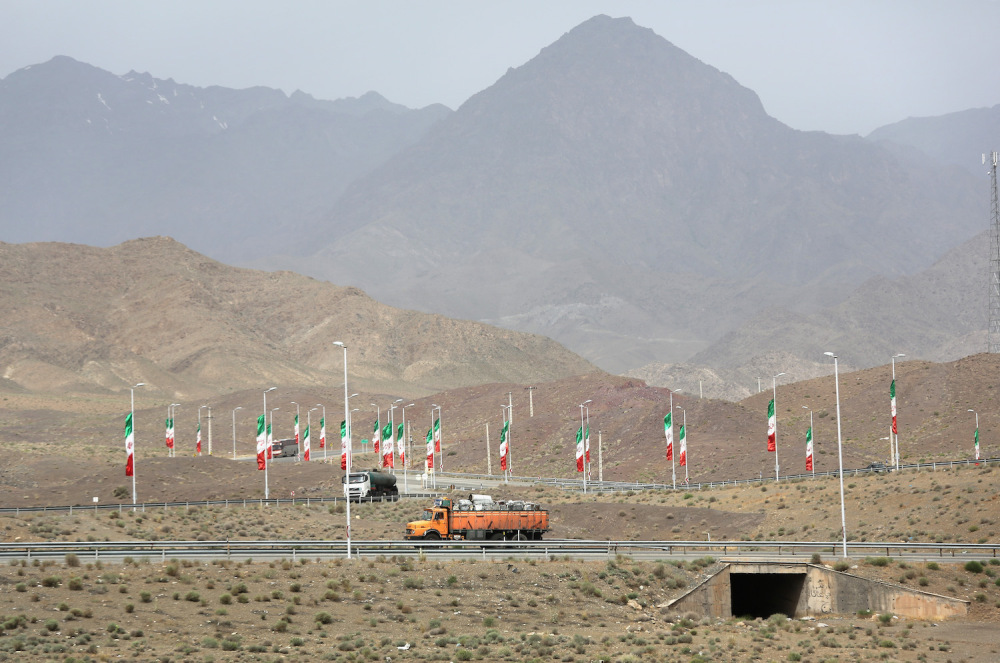Israel Attacks Iran Natanz Nuclear Site, Complicating Vienna Talks
Here is today’s Foreign Policy brief: Israel suspected of striking Iran nuclear site, Guillermo Lasso wins surprise victory in Ecuador’s presidential election, and India overtakes Brazil with second-highest COVID-19 cases worldwide.
If you would like to receive Morning Brief in your inbox every weekday, please sign up here.
Iran’s main nuclear enrichment site at Natanz was sabotaged in an apparent Israeli operation on Sunday, one day after Iran launched new, advanced centrifuges at the facility.
The scale of the attack, which Iranian officials said caused a power failure, is not yet known. The nature of the attack is also unclear: The blackout could have been caused by explosives, according to unnamed intelligence officials cited by the New York Times. Israeli media have speculated about a possible cyberattack conducted by the Mossad.
The incident came on the day of a milestone for U.S.-Israel relations under the Biden administration—the first visit to Israel by a cabinet official—although it was not clear whether U.S. Defense Secretary Lloyd Austin discussed the strike with his counterpart Benny Gantz in Tel Aviv. A senior U.S. administration official told the Washington Post’s John Hudson that the United States “had no involvement” in the attack.
Vexing Vienna. The strike on Natanz is an indication of how little faith Israel has in talks between the founding parties to the Iran nuclear deal currently taking place in Vienna. The United States is not part of direct negotiations, but expert groups are believed to be working through the issues of sanctions relief and a U.S. return to the deal. Adding up Israel’s recent actions against Iran’s nuclear program—from assassinating one of its top scientists to repeatedly sabotaging its facilities—it appears Israel sees its own activities as more effective at delaying Iran’s path to a nuclear bomb than any diplomatic efforts.
Not so cold war. It’s also another action in a tit-for-tat battle with Iran that is becoming indistinguishable from outright warfare. Last week, a ship used by Iran’s Islamic Revolutionary Guard Corps was damaged by an Israeli mine in the Red Sea, adding to a string of attacks (at least 10 since 2019) against Iranian vessels. Iran has launched attacks of its own, most recently carrying out a missile strike on an Israeli container ship in March.
On Tuesday, April 13, Russian Foreign Minister Sergei Lavrov travels to Iran to meet with his Iranian counterpart Mohammad Javad Zarif.
On Wednesday, April 14, U.S. Defense Secretary Lloyd Austin meets NATO Secretary-General Jens Stoltenberg in Brussels.
Talks in Vienna surrounding a U.S. return to the 2015 Iran nuclear deal resume.
On Friday, April 16, the Cuban Communist Party holds its eighth national congress. Raul Castro is expected to step down from his position as first secretary, with President Miguel Diaz-Canel due to succeed him.
U.S. climate envoy John Kerry is expected to travel to China this week to meet with his Chinese counterpart Xie Zhenhua, although the exact dates are not yet known.
What We’re Following Today
Surprise in Ecuador. Guillermo Lasso, a conservative, has won a surprise victory in Ecuador’s presidential election, beating his socialist opponent Andrés Arauz by a five-point margin in the country’s second-round runoff on Sunday. Lasso’s victory came close to never happening, after he and indigenous leader Yaku Pérez virtually tied in second place behind Arauz in the first round of voting. Lasso has promised to increase oil production, attract more foreign direct investment, and vaccinate 9 million Ecuadorians within his first 100 days.
Peru’s first round. According to early results, the leftist trade union leader Pedro Castillo appears to have captured the highest number of votes (16 percent) in the first round of Peru’s presidential election. If current trends hold, Castillo will face off in the second round against the right-wing economist Hernando de Soto (who has 13.8 percent with just over 40 percent of ballots counted)—although there is still a chance he could face the far-right Rafael López Aliaga or Keiko Fujimori, the daughter of imprisoned former President Alberto Fujimori.
India is new COVID epicenter. India has overtaken Brazil as the country with the second-highest number of coronavirus infections worldwide, after a record daily count of 168,912 new cases was reported on Monday. The jump in cases comes as huge crowds are expected to gather in India’s northern city of Haridwar this month for the Kumbh Mela religious festival.
Söder vs. Laschet. Markus Söder, the Bavarian state premier, has officially thrown his hat in the ring to run as Angela Merkel’s successor as the Christian Democratic Union/Christian Social Union candidate for German chancellor. Söder faces competition from Armin Laschet, who was voted in as chair of the CDU in January and is seen as the de facto choice. If successful, Söder would be the first leader of the CSU—the CDU’s Bavarian sister party—to win the chancellorship. A CDU/CSU victory is far from assured, as low polling and poor regional election results may foreshadow a desire for change.
A happy Hashemite family? Jordan’s Prince Hamzah appeared in public for the first time since he was placed under house arrest last week. The prince appeared with his half-brother, King Abdullah II, as they prayed at a family tomb on the centenary of the establishment of Transjordan, the Hashemite kingdom’s predecessor. Although this is the first time Prince Hamzah has been seen in public, the whereabouts of the 18 others detained by Jordan’s security forces over an alleged sedition plot are unknown.
Biden’s refugee cap. The United States is on track to accept the lowest number of refugees in decades, despite an announcement by U.S. President Joe Biden that he would lift the Trump-era cap on admissions from 15,000 to 125,000. If trends continue, the United States will accept 4,510, or less than half the number of refugees during the last year of the Trump presidency. The International Rescue Committee has urged Biden to sign a presidential determination that would lift the current cap and allow 62,500 refugees to enter the United States in the second half of this fiscal year.
The death of Prince Philip, the husband of Britain’s Queen Elizabeth II, triggered mourning rituals across the country over the weekend as sporting events observed silences and regular television programming was interrupted to broadcast commemorative tributes (leading to some complaints from the viewing public).
The mourning is not only reserved for the United Kingdom—on one of Vanuatu’s islands, Tanna, hundreds of members of a local tribe have long venerated Prince Philip as akin to a god, and are preparing to mourn his passing.
Although it’s unclear how the Prince Philip Movement began, it is believed to have taken root in the 1970s—given life by the royal couple’s visit in 1974. Key to the movement is the belief that Prince Philip is one with the tribe, and fulfilled a prophecy of a tribesman who had found a powerful wife overseas and “would return some day, either in person or in spiritual form,” Kirk Huffman, an anthropologist, told the BBC.
Five of Tanna’s tribal leaders met Prince Philip at Windsor Castle in 2007 and pressed him on when he would return to them. “When it turns warm, I will send a message,” he is reported to have replied.






